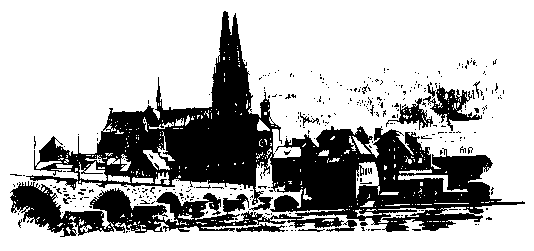| Volume Twenty — Article 6 | Volume 20 | Home |
|
The Attempted Compromise of Ratisbon James Buchanan 
The way had been prepared for some such attempt by the work of Erasmus, 'On Concord in Religion,' in 1533, which aimed at the reconciliation of the two parties, and ascribed almost as much to grace and faith as the Reformers could desire, while it adhered to the Popish idea of Justification, as 'a purifying work on the heart,' and to the Popish doctrine also of reward and merit.' But the book which was the immediate occasion of the negotiations that followed, was compiled by Gropper, one of the Canons of Cologne, whose Archbishop, the pious Hermann, had attempted to reform his diocese by means of a Provincial Council in 1536. That Council drew up a number of articles, which were afterwards digested and published by Gropper, and which were mainly directed "to palliate the Popish doctrines, and to colour them with new interpretations." This worthless book, which Luther had seen before, and characterized as "crafty and ambiguous,' and of which the mild Melancthon had said, "There is nothing so monstrous, that it may not be made to appear plausible by dexterous management, and the magic touch of a skilful sophister, "came into the hands of the Emperor. It pleased him as a politician, because it recommended concessions, sometimes on one side, and sometimes on the other; and he presented it to the Diet at Ratisbon as a basis of agreement, naming three divines on each side —Eckius, Cropper, and Pflug, for the Romanists, — and Melancthon, Bucer, and Pistorius, for the Protestants, —to examine it, and report. Strange as it may seem, an article on Justification was agreed upon in the conference of divines, — subject, however, to the approbation of the Diet, — an article which was afterwards found to be satisfactory to neither party, but offensive to both; and as it throws an instructive light on the new policy which began to be adopted at that time by the adherents of Rome, and which has been pursued, more or less consistently, ever since, we may mark, first, the large concessions which were now made in favour of the Protestant doctrine of Justification; and, secondly, the careful reservation of one point, and only one, which was so ambiguously expressed as to be susceptible of different interpretations, while, according to the sense in which it was understood, it involved the whole difference between the Popish, and the Protestant, method of acceptance with God, —between Justification by imputed, and Justification by infused or inherent, righteousness. That these statements contain the substance of the Protestant doctrine is undeniable; and had they stood alone, they might have justified the fond belief which Melancthon once expressed when he said,
That point was — the faith by which we are justified, — or rather the precise function which belongs to it, and the ground or reason of the efficacy which is ascribed to it. According to the Protestant doctrine, it (faith) is the (PTM editors: the instrumental means) means of Justification, simply because it receives and rests upon (PTM editors: the meritorious cause) Christ alone, — because it apprehends and appropriates His righteousness as its only plea, — because it implies an absolute renunciation of all self-dependence, and consists in an entire and cordial reliance on Christ as "the Lamb of God which taketh away the sin of the world,"— as "the propitiation for our sins through faith in His blood,"— and as "the end of the law for righteousness to every one that believeth in His name". But according to the Popish doctrine, faith justifies, not by uniting the sinner to Christ, and making him a partaker of Christ's righteousness, — but by "working" in him, and "sanctifying" him, — by being, in its own essential nature as one of the "fruits of the Spirit," and by producing, in its actual operation as a vital principle which "worketh by love," a real inherent righteousness, which is, on its own account, acceptable to God, and which constitutes the immediate ground of his acceptance; — in short, by making him righteous, subjectively, so that thereby, and on that account, he may be reputed righteous, and obtain at once the pardon of sin, and a title to eternal life. This cardinal point, which may be justly said to be the hinge on which the whole question turned, was carefully reserved, or wrapt up in ambiguous terms at Ratisbon; — and these were only the more insidious, because they contained a truth respecting the nature and effects of justifying faith, which the Reformers held as strongly as their opponents. The article declared, that "sinners are justified by a living and effectual faith, which is a motion of the Holy Spirit, whereby, repenting of their lives past, they are raised to God, and made real partakers of the mercy which Jesus Christ hath promised, ... which no man attains but at the same time love is shed abroad in his heart, and he begins to fulfil the law;" and that "this is not to hinder us from exhorting the people to increase this faith and this charity by outward and inward works; so that, though the people be taught that "Faith without the deeds of the Law" justifieth, yet repentance, the fear of God and His judgments, and the practice of good works, ought to be preached unto them." All this is true, but it is not relevant to the question at issue. It relates to faith, not as it justifies, but as it sanctifies, a sinner. It diverts the mind from the external object of justifying faith, which is Christ alone, and His perfect righteousness; and directs it to the inward effect of faith, in changing the character and conduct of the sinner, and producing an inherent, but imperfect, righteousness of his own. The doctrine is sound and wholesome in its own place, and in its proper connection; but it becomes unsound and dangerous, when it is mixed up with the truth which relates to the ground and reason of a sinner's pardon and acceptance with God. It virtually substitutes the work of the Spirit in us, in the place of the work of Christ for us; or, at least, it does not represent the work of the Spirit as the mere application of the redemption and righteousness of Christ, already wrought out by Him, and sufficient of itself for the immediate justification of every believer, but as being, either in whole or in part, the ground or reason on account of which God bestows His forgiveness and favour. And thus, by introducing the sanctifying effects of faith into their definition of it, as it is the means of Justification, the Popish divines made provision for falling back on their favourite doctrine of an inherent, as opposed to an imputed, righteousness; and for ultimately setting aside all the concessions which they had apparently made.
That their original charge against the Protestant doctrine as a 'novelty,' and their subsequent claim to it as the 'old doctrine' of the Church, could not both be true, is evident, for they are manifestly contradictory; and it might seem incredible that they could have been adopted by the same parties in good faith. In the minds of some, there might have grown up a clearer perception of the Protestant doctrine and of its scriptural evidence than they had before the Reformation, — as in the case of Bishop Vergeno, who was converted in attempting to refute it, — of Cardinal Cajetan, whose commentary on the Epistle to the Romans bears traces of his having learned something from his conferences with Luther, and even of the Emperor himself, of whom it has been said that,
In the case of others, there might be a change of policy and profession, where there was no corresponding conviction of the truth; and this seems to be the true explanation of the conduct which was pursued by the chief Popish agents at Ratisbon; for Melancthon, speaking of Eckius, complained of his "sophisms and juggling tricks," and said, "He sports with terms of the most serious import, — continually conceals his real meaning, and only aims to embarrass an adversary. There is great danger in encountering sycophants of this kind." And Bucer, speaking of Gropper, who afterwards wrote against the very doctrine which he had professed to receive, and actively promoted the deposition of the venerable reforming Archbishop of Cologne, affirmed that "Gropper either sincerely assented to the Evangelical doctrine, or with solemn asseverations protested it." Whether it proceeded from conviction or from policy, there was a striking change at this date in the treatment which the Romish Church bestowed on the Protestant doctrine of Justification; a change so great as to warrant the distinction, which still exists, between Old and New Popery. It might seem, then, that there was no radical or irreconcilable difference between the two; and yet, when they came to explain their respective views, it was found that they were contending for two opposite methods of Justification, — the one by an inherent, the other by an imputed, righteousness, — the one by the personal obedience of the believer, the other by the vicarious obedience of Christ, — the one by the inchoate and imperfect work of the Spirit in men, the other by the finished work of Christ for them, when "He became obedient unto death, even the death of the cross." This fact shows the utter folly of every attempt to reconcile two systems, which are radically opposed, by means of a compromise between them; and the great danger of engaging in private conferences with a view to that end. In the open field of controversy, truth, so far from being endangered, is ventilated, cleared, and defined; in the secret conclaves of divines, and the cabinets of princes, it is often smothered, or silenced. It has far less to fear from discussion, than from diplomacy. |
 The concessions which were made to the Protestants were apparently large and liberal; for the article, as preserved by Du Pin, expressly bears, —that "since the fall of Adam, all men are born enemies of God, and children of wrath by sin,"— that "they cannot be reconciled to God, or redeemed from the bondage of sin, but by Jesus Christ, our only Mediator,"— that "their mind is raised up to God, by faith in the promises made to them, that their sins are freely forgiven them, and that God will adopt those for His children who believe in Jesus Christ,"— that "faith justifies not, but as it leads us to mercy and righteousness, which is imputed to us through Jesus Christ and His merits, and not by any perfection of righteousness which is inherent in us, as communicated to us by Jesus Christ,"—and that "we are not just, or accepted by God, on account of our own works or righteousness, but we are reputed just on account of the merits of Jesus Christ only."
The concessions which were made to the Protestants were apparently large and liberal; for the article, as preserved by Du Pin, expressly bears, —that "since the fall of Adam, all men are born enemies of God, and children of wrath by sin,"— that "they cannot be reconciled to God, or redeemed from the bondage of sin, but by Jesus Christ, our only Mediator,"— that "their mind is raised up to God, by faith in the promises made to them, that their sins are freely forgiven them, and that God will adopt those for His children who believe in Jesus Christ,"— that "faith justifies not, but as it leads us to mercy and righteousness, which is imputed to us through Jesus Christ and His merits, and not by any perfection of righteousness which is inherent in us, as communicated to us by Jesus Christ,"—and that "we are not just, or accepted by God, on account of our own works or righteousness, but we are reputed just on account of the merits of Jesus Christ only."  The article thus carefully concocted, and couched in ambiguous terms, was satisfactory to neither party, and was openly denounced by both. It had too much of the Gospel in it to be palatable to the consistent adherents of Rome, and too much of disguised legalism to be acceptable to the Reformed. On the one side, the Legate, Cardinal Contarini, was charged by Cardinal Caraffa, who afterwards became Pope as Paul IV., with having betrayed the cause of the Church, especially on the question of Justification. On the other side, the Elector of Saxony objected strongly to the article, and complained that "the doctrine of Justification by "Faith without the deeds of the Law", was well nigh buried beneath appendages and explanations."
The article thus carefully concocted, and couched in ambiguous terms, was satisfactory to neither party, and was openly denounced by both. It had too much of the Gospel in it to be palatable to the consistent adherents of Rome, and too much of disguised legalism to be acceptable to the Reformed. On the one side, the Legate, Cardinal Contarini, was charged by Cardinal Caraffa, who afterwards became Pope as Paul IV., with having betrayed the cause of the Church, especially on the question of Justification. On the other side, the Elector of Saxony objected strongly to the article, and complained that "the doctrine of Justification by "Faith without the deeds of the Law", was well nigh buried beneath appendages and explanations."